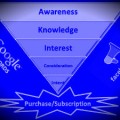In many companies the marketing and sales departments are at odds. They often fight for resources and power.
Most often they are two separate entities reporting to the CEO. Sometimes marketing reports to sales and on some occasions, mostly in smaller companies, it’s the other way around.
Which is right? If you are starting your company should you set up a sales department or a marketing department first?
The answer lies in the product or service you are selling as well as in the market you wish to address.
When sales should trump marketing
 If your product or service is highly complex and its benefits cannot be explained quickly then you need to have someone who can find the right way to do this and adapt the explanation to the customer in front of him or her. This is the case most often for industrial products. The product itself can be simple but it may come in a multitude of variations according to specific needs. An example would be windows. Everyone knows what a window is but when you start looking into it you will find they come in various amounts of layers, in hundreds of types of glass, with various types of gas in between layers, with multiple types of mountings, etc.
If your product or service is highly complex and its benefits cannot be explained quickly then you need to have someone who can find the right way to do this and adapt the explanation to the customer in front of him or her. This is the case most often for industrial products. The product itself can be simple but it may come in a multitude of variations according to specific needs. An example would be windows. Everyone knows what a window is but when you start looking into it you will find they come in various amounts of layers, in hundreds of types of glass, with various types of gas in between layers, with multiple types of mountings, etc.
Another situation where sales should trump marketing is in the case where your target market has complex needs. Most complex needs, but definitely not all, can be traced back to emotional rather than logical responses. An example would be if your product or service is fulfilling a status need. If your customers need to feel important, they will require one on one contact and made to feel special.
In both these cases a marketing approach, as good as it may be, will not suffice to convince the buyer. He or she needs to ask multiple questions and make sure that his or her needs are satisfied with the right product and treatment.
This doesn’t mean of course that marketing is not necessary. Every company needs to understand their product, pricing, promotion, distribution, market knowledge and customer needs. It simply means that marketing should be under the responsibility of the sales department.
It is important not to confuse sales representatives with clerks or agents. The representatives’ job is to find customers, convince them and close the sale. Clerks and agents such as the ones in stores or technical agents that help understand complex technological customer needs are there to facilitate a sale not make it.
When marketing should trump sales
 I imaging you get the gist of my argumentation by now. If complex products and needs make sales trump marketing then simpler products and needs make marketing trump sales.
I imaging you get the gist of my argumentation by now. If complex products and needs make sales trump marketing then simpler products and needs make marketing trump sales.
If your company sells a widget or only a few variations of this widget, even if it’s in a B2B context, you don’t really need a sales team. You can make use of a call center with agents, if revenues justify the costs, but you don’t need representatives on the road. Sales agents become a marketing tool just as a web campaign or direct mail campaign would. Usually a marketer will find the customers and write the script that will be used by the sales agents to convince and close the sale. Call centers operate under the responsibility of the marketing department.
Sales representatives are significantly more costly, on a percentage of sales revenue basis, than marketers. Hence they should only be used when marketing alone is insufficient to convince your customers to purchase your product or service.
This is one of the most important staffing choices you will be making in your company in terms of sales revenue. Make sure it’s the right one.









